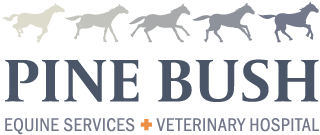Horse Show Biosecurity Tips
Horse show season is an exciting time for horse owners and enthusiasts. It is a time to showcase their horses and talents while travelling to new places and meeting up with folks that share the same interests. In order to keep the show season running smoothly, horse show people need to be mindful of their actions and the health of their own horse. Everyone plays a role in the safety of the animals involved, from the judges to the competitors, attendees, veterinarians and spectators. Please review the following tips before heading to the next show:
Temperatures
Know your horse’s normal temperature (anything over 101.5F may be abnormal). Temps should be taken twice daily but especially before, during and after events the horse attended (at home stable or elsewhere).
Horses that have an elevated temperature up to 2 weeks before an event should not attend the event and should have a veterinarian examine them.
If there is an elevated temperature recorded at an event (>101.5F), contact the show manager and veterinarian immediately. Do not move the horse unless told to do so by show officials or veterinarian.
Horses returning home from an event should be isolated from all other horses for 2 weeks. Monitor and record temperatures and if an elevated temperature is recorded during that time (>101.5), contact your veterinarian.
Other Health Issues
Any nasal discharge, cough or change in manure that is not normal for your horse could indicate that your horse is incubating a disease that will either make it sick or other horses sick. Sick horses can cause shows to be cancelled.
Horses that have any of these symptoms up to 2 weeks before an event should not attend the event and have a veterinarian examine them.
If a horse is showing any of these symptoms at an event, contact the show manager and veterinarian immediately. Do not move the horse unless told to do so by show officials or veterinarian.
Horses returning home from an event should be isolated from all other horses for 2 weeks. Monitor and records temperatures/symptoms and if any of these symptoms are recorded, contact your veterinarian.
Vaccination
Plan ahead and discuss the show’s vaccination requirements with your veterinarian. Vaccinate your horse accordingly allowing enough time for the vaccine to provide the best protection which may be up to two weeks before the show.
May 2019.clm
Consider other vaccines (outside show requirements) that may also protect your horse during show season.
Keepin’ Clean!
Items
- Use separate halters, leads, grooming equipment and tack for each horse.
- Do not share equipment with other people.
- Do not let the end of the water hose touch any of your buckets.It can be a source of contamination from another horse’sbucket.
- Thoroughly wash and disinfect items (grooming tools, bits,water buckets and other equipment) before and after using on your horse(s). When materials like leather or wood can’t be properly sanitized, cleaning and allowing it to dry in direct sunlight may be best.
- Remove manure from the stall frequently and dispose of at designated areas to minimize places for flies and other insects to gather.
- People
- Change your clothing and footwear before and after showing with your horse.
- Limit who has access to your horse, its stall or feed/water.
- If hand washing stations are not available, keep hand sanitizer or disposable gloves available at all times. Have people wear gloves when examining your horse.
- Trailers
- Know who is trailering your horse and where it has been. Is it clean? When was it last cleaned? Clean trailers should have no manure, old feed, dirty matts, or used bedding inside. All of this could potentially carry infectious agents to your horse. After cleaning, the inside and outside of trailer should be disinfected with an acceptable product.
- Disinfect vehicles and trailers prior to entering showgrounds if they have been offsite.For more information on biosecurity at shows, cleaning and disinfecting, vaccinating and horse dieases, go to: The Equine Disease Communication Centerwww.equinediseasecc.org
